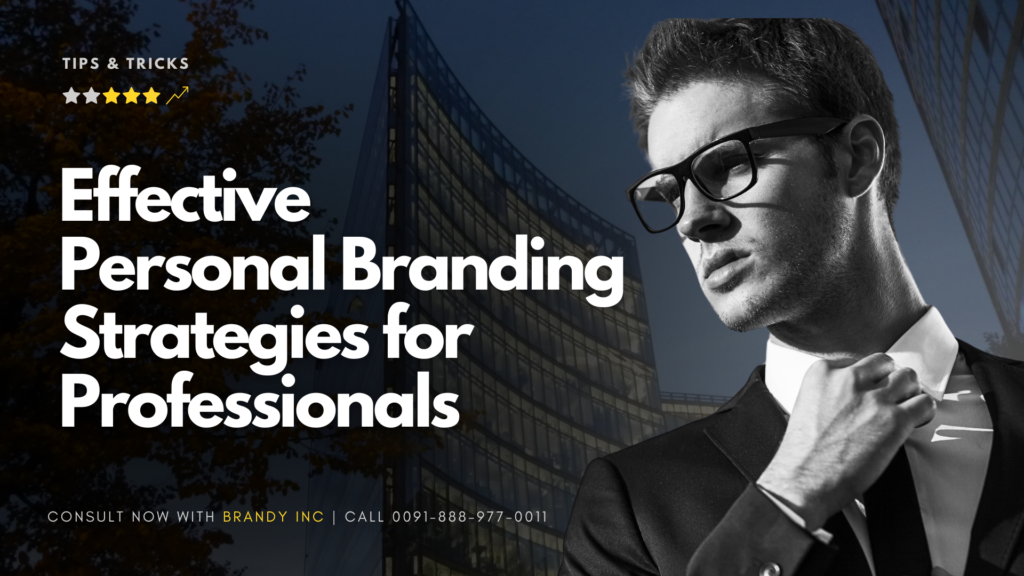Introduction
In today’s competitive market, personal branding isn’t just a trend—it’s a necessity. For over 20 years, Brandy Inc. has been at the forefront of online reputation management, helping professionals, SMEs, and high net worth individuals build and protect their personal brands. A strong personal brand can open doors, establish authority, and connect you with opportunities globally. Here’s how to craft an effective personal brand.
Understanding Personal Branding
Definition and Significance
Personal branding is the art of marketing yourself and your career as a brand. It defines who you are, what you stand for, and the unique value you offer. Unlike corporate branding, which focuses on a company, personal branding is all about you—your skills, personality, and values.
Difference Between Personal and Corporate Branding
Corporate branding builds a cohesive image for an organization, whereas personal branding is more individualistic. It’s about crafting a narrative that highlights your unique attributes and positions you as an industry expert.
Identifying Your Unique Value Proposition
Discovering Your Strengths and Skills
Begin by identifying what makes you unique. Reflect on your strengths, skills, and experiences. What do you excel at? What are your passions? These elements form the cornerstone of your personal brand.
Defining Your Core Values
Your core values are the principles that guide your actions and decisions. They shape your brand’s personality and help you connect with others on a deeper level. Define what matters most to you and ensure these values are reflected in your branding efforts.
Creating a Strong Online Presence
Building a Professional Website
A professional website is your digital headquarters. It’s a platform to showcase your portfolio, share your insights through a blog, and provide contact information. A well-designed website enhances your credibility and helps potential clients or employers learn more about you.
Importance of Social Media Profiles
Social media is a powerful tool for personal branding. Platforms like Twitter, Instagram, and Facebook allow you to share your expertise, engage with your audience, and build a community. Ensure your profiles are professional, up-to-date, and reflect your brand’s voice.
Utilizing LinkedIn Effectively
LinkedIn is essential for professional networking. Optimize your profile with a professional headshot, a compelling headline, and detailed descriptions of your experiences. Engage with your network by sharing insights, commenting on posts, and connecting with industry leaders.
Developing a Consistent Personal Brand Message
Crafting Your Brand Story
Your brand story is a narrative that communicates who you are, what you do, and why you do it. It should be authentic, engaging, and reflective of your journey. Share your successes, challenges, and the lessons you’ve learned along the way.
Creating a Tagline or Slogan
A tagline or slogan is a short, memorable phrase that encapsulates your brand’s essence. It should be concise, catchy, and reflective of your unique value proposition. Use it consistently across your online and offline platforms.
Consistency Across Platforms
Consistency is crucial for effective personal branding. Ensure your message, tone, and visual elements are uniform across all platforms. This creates a cohesive and recognizable brand identity.
Networking and Building Relationships
Importance of Networking
Networking is vital for personal branding. It helps you build relationships, gain insights, and uncover opportunities. Attend industry events, join professional groups, and connect with peers to expand your network.
Tips for Effective Networking
Effective networking is about quality, not quantity. Focus on building meaningful connections rather than collecting business cards. Be genuine, listen actively, and follow up with the people you meet to maintain those relationships.
Leveraging Online and Offline Networks
Both online and offline networks are valuable. Online platforms like LinkedIn and professional forums allow you to connect with a broader audience, while offline events like conferences and meetups provide opportunities for face-to-face interactions.
Content Creation and Sharing
Blogging and Vlogging
Creating content is a great way to showcase your expertise and engage with your audience. Start a blog or a vlog to share your insights, experiences, and knowledge. Regular content creation helps establish you as a thought leader in your field.
Guest Posting and Collaborations
Guest posting on reputable websites or collaborating with other professionals can expand your reach and credibility. It introduces you to new audiences and strengthens your network.
Sharing Expertise on Social Media
Social media platforms are perfect for sharing bite-sized pieces of your expertise. Post tips, share industry news, and engage in conversations to position yourself as an expert and attract followers who are interested in your field.
Leveraging Public Speaking and Events
Benefits of Public Speaking
Public speaking enhances your visibility and establishes you as an authority in your field. It allows you to share your knowledge, connect with your audience, and build your reputation.
How to Get Speaking Opportunities
To get speaking opportunities, start by speaking at local events, joining professional associations, and submitting proposals to industry conferences. Leverage your network to find opportunities and gradually build your speaking portfolio.
Hosting Your Own Events
Hosting events, such as webinars, workshops, or meetups, can further establish your brand. It provides a platform to share your expertise, engage with your audience, and build a community around your brand.
Personal Branding Through Professional Development
Importance of Continuous Learning
Continuous learning is crucial for personal branding. It keeps you updated with industry trends, enhances your skills, and demonstrates your commitment to growth.
Certifications and Courses
Pursuing certifications and courses relevant to your field can boost your credibility. It shows that you are knowledgeable and committed to staying current in your profession.
Attending Workshops and Seminars
Workshops and seminars offer opportunities for learning and networking. They allow you to gain new insights, meet industry experts, and stay informed about the latest developments in your field.
Utilizing Testimonials and Reviews
Gathering and Displaying Testimonials
Testimonials from clients, colleagues, and mentors can significantly enhance your personal brand. They serve as social proof and validate your expertise. Collect testimonials and display them prominently on your website and social media profiles.
Encouraging Reviews on Professional Sites
Encourage satisfied clients and colleagues to leave reviews on professional sites like LinkedIn, Google My Business, or industry-specific platforms. Positive reviews can boost your credibility and attract new opportunities.
Showcasing Success Stories
Share success stories and case studies that highlight your achievements and the impact of your work. This not only demonstrates your expertise but also builds trust with your audience.
Managing Your Online Reputation
Monitoring Your Digital Footprint
Regularly monitor your digital footprint to ensure that your online presence aligns with your brand. Use tools like Google Alerts to stay informed about what’s being said about you online.
Handling Negative Feedback
Negative feedback is inevitable, but how you handle it can make a significant difference. Respond professionally, address the issue, and take steps to resolve it. This shows that you are responsible and committed to improving.
Online Reputation Management Tools
Utilize online reputation management tools to monitor and manage your brand’s reputation. Tools like BrandYourself, Reputology, and Mention can help you track and respond to online mentions.
Visual Branding Elements
Choosing a Professional Headshot
A professional headshot is a key element of your personal brand. Invest in a high-quality, professionally taken photo that reflects your brand’s personality.
Consistent Visual Identity (Colors, Fonts, Logos)
Consistency in visual elements like colors, fonts, and logos creates a cohesive brand identity. Choose elements that reflect your brand’s personality and use them consistently across all platforms.
Importance of Professional Design
Professional design enhances the credibility and appeal of your brand. Whether it’s your website, social media profiles, or marketing materials, ensure that they are visually appealing and professionally designed.
Measuring and Adjusting Your Personal Brand Strategy
Setting Personal Branding Goals
Set clear, measurable goals for your personal branding efforts. Whether it’s increasing your LinkedIn connections, getting more speaking engagements, or driving traffic to your website, having goals helps you stay focused and track your progress.
Tools for Measuring Success
Use tools like Google Analytics, LinkedIn Analytics, and social media insights to measure the success of your personal branding efforts. Track metrics like website traffic, engagement rates, and follower growth.
Adjusting Strategy Based on Feedback
Regularly review your personal branding strategy and adjust it based on feedback and results. Stay flexible and be willing to make changes to improve your brand’s effectiveness.
Case Studies of Successful Personal Brands
Analysis of Notable Personal Brands
Study successful personal brands in your industry to understand what makes them stand out. Analyze their strategies, content, and engagement methods to gain insights that you can apply to your own branding efforts.
Key Takeaways from Their Strategies
Identify key takeaways from successful personal brands and incorporate those lessons into your strategy. This can provide inspiration and guidance as you build and refine your own personal brand.
Conclusion
Building an effective personal brand takes time, effort, and consistency. By identifying your unique value proposition, creating a strong online presence, networking, and continuously developing your skills, you can establish a personal brand that sets you apart and opens doors to new opportunities. Remember, your personal brand is a reflection of who you are, so stay authentic and true to yourself throughout the process.
Ready to elevate your personal brand? Contact Brandy Inc. today to learn more about how we can help you build a powerful online reputation. Request a Proposal



